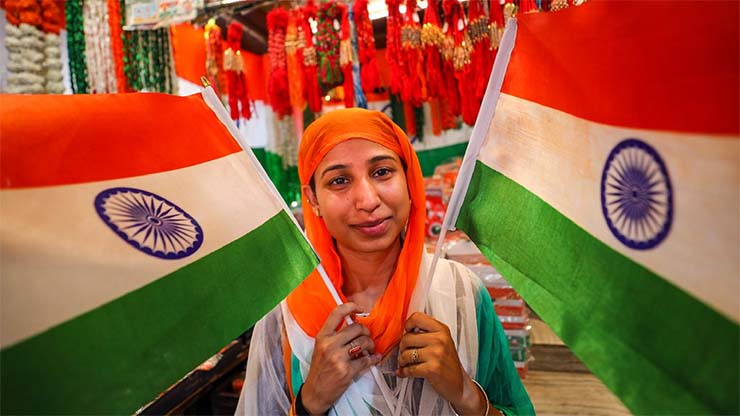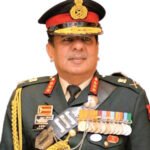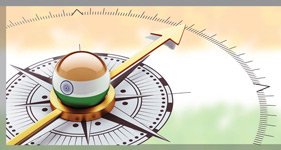The Idea of India: “The Idea of India” is a phrase that often refers to the diverse and pluralistic nature of India as a nation, encompassing its cultural, social, religious, and historical complexities. The idea of India is a living, breathing foundational construct that continues to evolve and shape the nation’s trajectory as it surmounts the challenges to its centennial independence anniversary. It is a tapestry woven from the threads of unity in diversity, secularism, inclusivity and tolerance, democratic governance, cultural heritage, social justice, and economic progress as the identity of Bharat, in the spirit of “Nation Above All”.
The idea of India is a beacon of hope that guides its people towards a future characterised by its immense potential on the global stage. It is a multifaceted concept that embodies the nation’s rich history, diverse cultures, pluralistic society, and aspirations for progress. This idea has evolved over millennia, reflecting the collective consciousness of its people and their unwavering commitment to upholding these values of inclusivity, secularism, and social harmony. As India marches forward, we the people of India must shoulder our responsibility and hold ourselves self-accountable for the furtherance of these values that define the essence of the nation.
India’s Journey to Independence: A Testament of Resilience and Determination
The struggle for India’s independence stands as a remarkable testament to the nation’s unyielding spirit, resilience, and unwavering determination. Spanning several decades, this arduous journey was marked by a multitude of sacrifices, movements, and leaders sung and unsung who guided the nation towards self-rule. The story of India’s liberation is not merely a historical narrative; it is a reflection of the indomitable human spirit, united in its pursuit of freedom and justice. It demonstrated that a determined population, driven by a shared vision, can overcome seemingly insurmountable odds and carve its destiny. The nation’s diverse cultural, linguistic, and religious tapestry was woven together by a common thread of patriotism, underscoring the significance of a collective identity in the pursuit of liberty. This historic saga serves as a reminder that the path to liberation is often fraught with challenges, yet the collective will of a determined populace can shape the destiny of a nation. As India continues to navigate the complexities of the modern world and internal challenges, its journey to the centennial anniversary of independence must remain an enduring source of inspiration and a reminder of the heights that can be reached through unity, sacrifice, and unwavering commitment to the larger role of nation building by the people who define the state.
Threads Weaving the Future of India
Cultural Vibrancy: India’s cultural tapestry is a dazzling array of rich heritage, festivals, art forms, music, and literature that reflect the country’s creativity and vibrancy. The idea of India celebrates this cultural diversity as a source of strength and identity, fostering a sense of belonging and pride. The teachings of mythological epics like Ramayana and Mahabharata, values and education imbibed by ancient Hindu Vedic civilizations, statecraft with threads from Kautilya’s Arthashastra and braving repeated invasions from the time of Alexander the Great in the year 321 BC to the British, only reinforced the idea of India. The secular threads and unity of the nation stood firm and deeply engrained, never severed or completely submerged by repeated challenges to its survival. This was a result of an over 5000 years old time-tested system based on “Dharma-Artha-Kama-Moksha”. The idea of India embraces the Upanishads’ worldview of “Vasudhaiva Kutumbakam”, a Sanskrit phrase, which means “the world is one family”. “Satyameva Jayate” (Sanskrit of “Truth alone triumphs”), a mantra from the ancient Indian scriptures, symbolised the deep cultural ethos and values. India was indeed a strong nation, with a strong economy and a glorious culture with the power and the strength of knowledge and character. This must remain a source of inspiration that continues to influence its present and future.
Unity in Diversity and Tolerance: India’s unique identity lies in its remarkable diversity – a mosaic of languages, religions, traditions, and cultures. India’s secular outlook and unity in diversity are two fundamental principles that have shaped the country’s identity since its independence in 1947. In its evolution challenges of communalism and religious intolerance, political exploitation and polarisation, caste-based discrimination, regionalism and linguistic divisions, economic disparities, grass-root level education, democratic freedom and erosion of traditional cultural values and practices impacting societies have challenged its trajectory. Despite these, a strong sense of unity prevails, fostering a spirit of coexistence and mutual respect, if untouched by petty politics. Preserving India’s religious tolerance and unity in diversity is an ongoing process that requires the collective effort of individuals, communities, and institutions to ensure a harmonious and inclusive society for all its citizens.
Indian History and Secularism: India’s history is deeply intertwined with the evolution of languages, the rise of civilizations, and the birth and growth of various religions. This diverse and dynamic heritage continues to shape India’s identity and global significance. India has been the origin of four of the planet’s largest and oldest religions – Hinduism, Jainism, Buddhism and Sikhism, making it a spiritual and religious epicentre. Traditionally all these have tolerance enshrined in their scriptures. Islam and Christianity arrived in India from outside, yet spread far and wide. The idea of India is rooted in the principle of inclusivity, where people of various faiths and backgrounds coexist without prejudice. The preamble of the Indian Constitution aims to constitute India a Sovereign, Socialist, Democratic republic. The terms ‘socialist and secular’ were added to it by the 42nd Amendment. Secularism is thus now a cornerstone of the Indian Constitution, upholding the freedom of religion while maintaining state neutrality. This commitment to pluralism serves as a guiding light for a society where every individual’s rights and beliefs are respected.
Democratic Framework and Inclusive Economic Growth: The Indian democracy, one of the world’s largest, is a testament to the people’s commitment to self-governance and political participation. The idea of India thrives within this democratic framework, empowering citizens to shape the nation’s policies and direction. India’s economic growth and development have bolstered the idea of a progressive nation. As a hub of technology, innovation, and entrepreneurship, India showcases its potential to become a global economic powerhouse while ensuring inclusive growth and sustainable development. Yet, fostering India’s democratic framework and inclusive economic growth is a multi-faceted and complex goal that requires careful consideration and coordinated efforts across various sectors of society. India, being one of the world’s largest and most diverse democracies, faces unique challenges and opportunities in achieving this objective. It would require strengthening democratic institutions for upholding the rule of law, separation of powers, and independence of the judiciary to ensure a robust democratic framework beyond petty politics. It must help in promoting transparent and accountable governance at all levels of government, encouraging civic participation and awareness through education and engagement. On the economic front, it must implement policies that ensure equitable distribution of resources and opportunities, reducing income and wealth disparities, and promoting balanced development across urban and rural areas. Its economic growth trajectory must be both inclusive and more efficient. The need is to further invest in human capital through education and skill development to empower the workforce and enhance employability. It requires a collective effort from government, civil society, businesses, and citizens to work together towards a prosperous and equitable future.

Self-Reliance: A Cornerstone for Growth and National Security. In the present geopolitical flux and powerplays, the concept of self-reliance holds a significant place in the growth and security of nations. It encompasses economic, technological, national defence, and social aspects, ultimately contributing to a nation’s sustainable development and bolstering its national security. India must progressively reduce its dependence on external sources to navigate global uncertainties with greater resilience, deny external leverages to its national security, and safeguard the well-being of its citizens.
Role of Citizenry in Shaping India’s Future
In the tapestry of a nation’s development, responsible citizens serve as the threads that weave together the fabric of prosperity and growth. India, a nation of diverse cultures and aspirations, thrives when its citizens actively engage in shaping its future. The role of responsible citizens in society cannot be understated, as their actions, values, and contributions play a pivotal role in driving India’s journey towards economic, social, and cultural advancement. Some areas that must seek responsibility and accountability are below.
Civic Responsibility and Active Engagement: Citizens must exhibit civic consciousness by actively participating in democratic processes. They must exercise their right to vote, electing representatives who will champion the nation’s interest first and work towards national progress. By engaging in public discussions, debates, and decision-making, citizens contribute to the formulation of policies that lead to socioeconomic growth.
Promoting Social Harmony and Unity: As responsible citizens we must understand the importance of social cohesion and work to bridge the gaps of caste, religion, and economic disparity. We must promote unity and tolerance, nurturing an environment where diversity is celebrated. The Indian Army champions this cause as a role model for the nation. By rejecting communalism and discrimination, or political polarisation of society, citizens contribute to a peaceful and harmonious society that is conducive to progress. The theme must be “Nation Above All”.
Education and Skill Development: We must recognise the power of education and skill development in driving inclusive economic growth and individual prosperity. Thus citizens must prioritise education for themselves and their children, and also support initiatives that enhance access to quality education for all. In addition, the rich Indian history and culture must be passed on in the correct context and undistorted by Western influence. Enhancing the technology threshold and promoting digitalisation is a bounded responsibility.
Environmental Stewardship: As responsible and accountable citizens, we must understand the importance of preserving the environment for future generations. The need is to adopt sustainable practices, reduce waste, and promote eco-friendly initiatives. By advocating for environmental conservation and supporting policies that address climate change, citizens contribute to a healthier, greener, and more sustainable India.
Community Development and Social Welfare: As a family, we must actively engage in community development and social welfare activities to uplift the less fortunate, promote healthcare, and provide education to underserved communities. Reservation and freebies are not the solutions to empowerment and self-growth. By addressing social challenges at the grassroots level, citizens play a vital role in reducing inequality and enhancing the overall well-being of society. Promoting healthcare and hygiene is both an individual and state responsibility.
Ethical Conduct and Rule of Law: We must uphold ethical values and adhere to the rule of law through a culture of self-discipline. The need is to promote honesty, integrity, and accountability in both personal and professional spheres. By abiding by laws and regulations, citizens contribute to a just and transparent society that encourages investment, innovation, and growth. There must be zero tolerance to indulge or encourage in corrupt practices, and those involved irrespective of the power and influence must be exposed by “we the people”.
Conclusion
India, a diverse and vibrant nation, has seen a remarkable journey towards development and progress. The present trajectory has tremendous opportunities, yet is fraught with myriad challenges and threats. While government policies, economic strategies, and technological advancements play a crucial role, the active participation of responsible citizens is vital for the sustained prosperity and growth of the nation. Their active engagement in democratic processes, promotion of social harmony, commitment to education, support for entrepreneurship, environmental stewardship, community development, and ethical conduct collectively will shape the nation’s trajectory. Let’s be the proud and responsible players to make 21st Century the Indian Century – “HUM HONGE KAMYAB”.
-The author is a PVSM, AVSM, VSM has had an illustrious career spanning nearly four decades. A distinguished Armoured Corps officer, he has served in various prestigious staff and command appointments including Commander Independent Armoured Brigade, ADG PP, GOC Armoured Division and GOC Strike 1. The officer retired as DG Mechanised Forces in December 2017 during which he was the architect to initiate process for reintroduction of Light Tank and Chairman on the study on C5ISR for Indian Army. Subsequently he was Consultant MoD/OFB from 2018 to 2020. The Officer is a reputed defence analyst, a motivational speaker and prolific writer on matters of military, defence technology and national security.The views expressed are personal and do not necessarily carry the views of Raksha Anirveda














